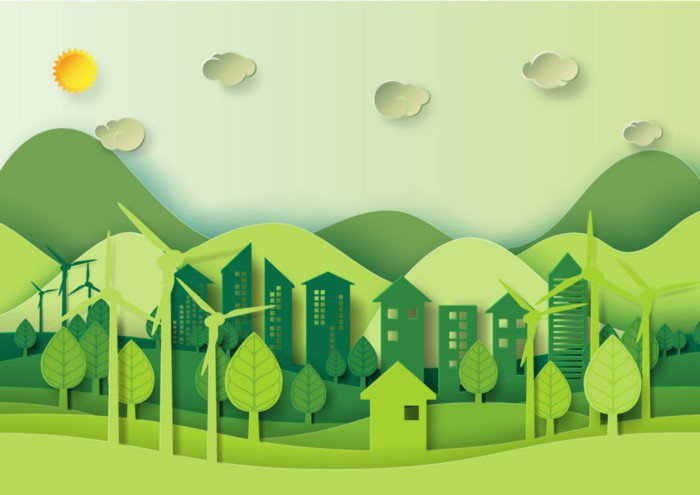Renewable Energy Transition in Africa
Towards achieving targets in Nationally Determined Contributions
By Timothy Ranja
With contributions from the ICPAC Climate Change Technical Working Group

© oecd-development-matters.org
Energy access and affordability is closely linked to socio-economic growth and sustainable development. Clean energy is essential in eradicating poverty and achieving sustainable development. It contributes both directly and indirectly to the achievement of the Sustainable Development Goals (SDG). Goal 7 of the SDGs aims at ensuring everyone has access to affordable, reliable and modern energy services by the year 2030. To achieve the SDG targets on energy access, it is crucial to increase investment in renewable energy. Use of renewable energy facilitates the achievement of SDG 13 “Take urgent action to combat climate change and impacts”. Promoting renewable energy can also enhance the achievement of the other SDGs targets such as environmental sustainability and human development.
The Challenge
With rapid population growth and economic progress, Africa is facing enormous challenges in its effort to achieve access to clean energy [1]. According to data from the International Energy Agency, around 600 million people (48% of the population) in Africa have no access to electricity. Additionally, over 890 million people cook with traditional fuels. It’s projected that by 2030, Sub-Saharan Africa will account for nearly 90% of the world’s population without electricity access and 40% without clean cooking energy. Over-reliance on traditional biomass for cooking is one of the drivers of desertification. Electricity generation in the continent is also heavily reliant on fossil fuel-based sources such as coal, gas and oil, which accounts for close to 80% of the total electricity generation. These fossil based sources of electricity generation results in increased pollution and emission of greenhouse gases. It is estimated that energy production and use accounts for about two-thirds of global greenhouse gas emissions — especially carbon dioxide.
Paris Agreement
By signing the Paris Agreement, countries committed to reduce emission of greenhouse gases. Scaling up renewable energy in Africa can significantly reduce energy related carbon dioxide emissions and accelerate the achievement of Paris Agreement targets.
The Paris Agreement requires each country to prepare and communicate their post 2020 climate actions known as revised Nationally Determined Contributions (NDCs). By July 2021, around 10 African countries including Ethiopia, Kenya, Rwanda and Sudan had submitted their revised NDCs to the UNFCCC. Most countries have included renewable energy in their NDCs, recognizing the crucial role of renewable energy in meeting the Paris Agreement targets. According to the NDC Partnership, 45 out of 53 African countries had included renewable energy targets in their first NDCs submitted in around the year 2016. Most African countries also have very ambitious renewable energy plans that can facilitate transition to a zero emission pathway. However, there is concern that the NDCs renewable targets are not as ambitious as the targets in the countries national energy plans. This is despite the huge renewable energy potential in Africa for sources such as solar, wind, biomass and geothermal.
Renewables
Modern renewables amounting to 310 GW could provide half of the continent’s total electricity generation. By 2019, electricity generation using renewables accounted for only about 19% of the total power generation. Africa’s geothermal potential is about 15GW, but the installed capacity is about 900MW which is only in Kenya and Ethiopia (and Kenya accounting for about 95%). Although around 40% of the world’s potential solar resources surface area is in Africa, the continent accounts for just 1% of the global solar capacity for generating electricity.
For renewable energy in the region to meet its potential and help meet the Paris Agreement, there is need for more targeted interventions and ambitions. Renewable energy programs should be aggressive, long-term and policy oriented. Strong and effective policies are critical for large scale deployment. In addition to environmental benefits, priority should be given to highlighting the real and tangible economic benefits (such as job creation and income generation) that renewable energy programs can deliver to the region. Due to the scale of some of the investments, most of the programs will be done by the private sector. Therefore there is a need to establish a conducive environment for private sector participation by aligning the NDC energy targets with the existing national energy policies and plans.
What Next
Since revised NDCs are expected to be more ambitious than the previous ones there is a window opportunity to make the current 2020 NDCs more ambitious on renewable energy actions. For instance Sudan in its 2020 updated NDC, committed to pursue a low emission and resilient development in the energy sector. The Sudan NDC targets 2140MW of utility scale grid connected solar and power, 796MW of standalone mini grid and 36.896GWh of hydro generation.
Lastly, promotion of renewable energy to meet NDC targets should not be viewed only in the context of mitigation. Renewables have a great role in building resilience — for instance through alternative uses of water in a hydropower dam, flood control, cooling in hot temperatures, and forest sustainability through biomass energy management. As in other sectors, the COVID 19 pandemic is threatening the progress made towards achieving clean energy access especially in Africa, because of new pandemic related priorities and policy maker attention.
On the flip side, renewable energy should play a key role in the post pandemic recovery as a cost-effective energy for essential services.
Reference
[1] Clean energy is energy that comes from renewable, zero emission sources that do not pollute the atmosphere when used, as well as energy saved by energy efficiency measures
